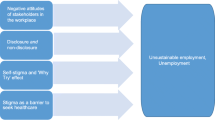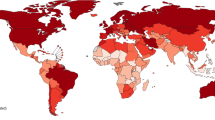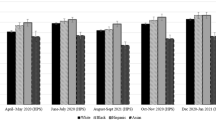Abstract
Psychiatric disorders and in particular depression have increased during the “Great Recession”. The aim of this study was to investigate the consumption of psychotropic drugs in people who lost their permanent employment, using administrative data. The study considered all of the subjects domiciled in Lombardy, Northern Italy, who lost a permanent employment between 2008 and 2010, not assuming psychotropic drugs and who did not find a new job within the following 12 months. The control group included people who did not lose permanent job in the study period, matched to the cases for gender, age, nationality, skill level, education and economic sector, using propensity score matching. The subjects who lost their permanent employment were 17 % more likely to receive one or more drug prescriptions than the controls, but the difference was significant only for males. Females, subjects aged >50 years, low skill level workers and Italians were more likely to have received a prescription for psychotropic drugs than respectively males, subjects aged 20–29 years or aged 30–39 years, low skill level workers and non-Italians. The average number of drugs prescribed for those who lost their job and those who continued working was respectively 2.9 and 3.1. In conclusion, losing a permanent job increases significantly psychotropic drugs consumption in males but not in females.
Similar content being viewed by others
References
Laaksonen E, Martikainen P, Lahelma E, Lallukka T, Rahkonen O, Head J, Marmot M. Socioeconomic circumstances and common mental disorders among Finnish and British public sector employees: evidence from the Helsinki Health Study and the Whitehall II Study. Int J Epidemiology 2007; 36:776–86.
Davis B. “What’s a Global Recession?”. In: The Wall Street Journal. 2009. http://blogs.wsj.com/economics/2009/04/22/whats-a-global-recession/
United Nations. World Economic Situation and Prospects 2013 (trade paperback) (1st ed.). United Nations. p. 200. The global economy continues to struggle with post-crisis adjustments. http://www.un.org/en/development/desa/policy/wesp/wesp2013/wesp13update
Eurostat-Selected Principal European Economic Indicators “Eurostat News Release-Euro indicators - 23 April 2012” (PDF). http://epp.eurostat.ec.europa.eu
Smith A. “Eurozone unemployment hits record high”. 2012 http://money.cnn.com/2012/10/31/news/economy/euro-unemployment/index.html
Riumallo-Herl C, Basu S, Stuckler D, Courtin E, Avendano M. Job loss, wealth and depression during the Great Recession in the USA and Europe. Int J Epidemiol. 2014; 43: 1508–17.
Gili M, Roca M, Basu S, McKee M, Stuckler D. The mental health risks of economic crisis in Spain: evidence from primary care centres, 2006 and 2010. Eur J Public Health. 2013; 23: 103–8.
Economou M, Madianos M, Peppou LE, Patelakis A, Stefanis CN. Major depression in the era of economic crisis: a replication of a cross-sectional study across Greece. J Affect Disord. 2013; 145: 308–14.
Schwarzbold ML, Diaz AP, Nunes JC, Sousa DS, Hohl A, Guarnieri R, et al. Validity and screening properties of three depression rating scales in a prospective sample of patients with severe traumatic brain injury. Rev Bras Psiquiatr 2014; 36: 206–12.
De Vogli R. Unemployment and suicides during the recession in Italy. BMJ. 2013; 347: f4908.
Mattei G, Ferrari S, Pingani L, Rigatelli M. Short-term effects of the 2008 Great Recession on the health of the Italian population: an ecological study. Soc Psychiatry Psychiatr Epidemiol. 2014; 49: 851–8.
Barr B, Taylor-Robinson D, Scott-Samuel A, McKee M, Stuckler D. Suicides associated with the 2008-10 economic recession in England: time trend analysis. BMJ. 2012;; 345: e5142.
Chan CH, Caine ED, You S, Fu KW, Chang SS, Yip PS. Suicide rates among working-age adults in South Korea before and after the 2008 economic crisis. J Epidemiol Community Health. 2014; 68: 246–52.
Corcoran P, Arensman E. Suicide and employment status during Ireland’s Celtic Tiger economy. Eur J Public Health. 2011; 21: 209–14.
Córdoba-Doña JA, San Sebastián M, Escolar-Pujolar A, Martínez-Faure JE, Gustafsson PE. Economic crisis and suicidal behaviour: the role of unemployment, sex and age in Andalusia, southern Spain. Int J Equity Health. 2014; 25: 13:55.
Garcy AM, Vågerö D. Unemployment and suicide during and after a deep recession: a longitudinal study of 3.4 milion Swedish men and women. Am J Public Health. 2013; 103: 1031–8.
Milner A, Morrell S, La Montagne AD. Economically inactive, unemployed and employed suicides in Australia by age and sex over a 10-year period: what was the impact of the 2007 economic recession? Int J Epidemiol. 2014; 43: 1500-7a.
Pompili M, Innamorati M, Di Vittorio C, Baratta S, Masotti V, Badaracco A, Wong P, Lester D, Yip P, Girardi P, Amore M. Unemployment as a risk factor for completed suicide: a psychological autopsy study. Arch Suicide Res. 2014; 18: 181–92.
Reeves A, McKee M, Stuckler D. Economic suicides in the Great Recession in Europe and North America. Br J Psychiatry. 2014; 205: 246–7.
Economou M, Madianos M, Peppou LE, Theleritis C, Patelakis A, Stefanis C. Suicidal ideation and reported suicide attempts in Greece during the economic crisis. World Psychiatry. 2013; 12: 53–9.
Coope C, Donovan J, Wilson C, Barnes M, Metcalfe C, Hollingworth W, et al. Characteristics of people dying by suicide after job loss, financial difficulties and other economic stressors during a period of recession (2010–2011): A review of coroners’ records. J Affect Disord 2015;183:89–105.
Vittadini G, Beghi M, Mezzanzanica M, Ronzoni G, Cornaggia CM. Use of psychotropic drugs in Lombardy in time of economic crisis (2007-2011): a population-based study of adult employees. Psychiatry Res. 2014; 220: 615–22.
Sicras-Mainar A, Navarro-Artieda R. Use of antidepressants in the treatment of major depressive disorder in primary care during a period of economic crisis. Neuropsych Dis Treat, 12, 29–40.
Bradford, WD, Lastrapes WD. A prescription for unemployment? Recessions and the demand for mental health drugs. Health Econ 2014; 23: 1301–25.
De Cuyper N, De Witte H. Job insecurity in temporary versus permament workers: associations with attitudes, well beingand behavior. Work stress. 2007; 21: 65–84.
Lee WW, Park JB, Min KB, Lee KJ, Kim MS. Association between work-related health problems and job insecurity in permanent and temporary employees. Ann Occup Environ Med. 2013; 25: 15.
Guest D. Flexible employment contracts, the psychological contract and employee outcomes: an analysis and review of the evidence. Int J Managment Rev. 2004; 5: 1–19.
Kirves K, De Cuyper N, Kinnunen U, Nätti J. Perceived job insecurity and perceived employability in relation to temporary and permanent workers’ psychological symptoms: a two samples study. Int Arch Occup Environ Health. 2011; 84: 899–909
Rosembaum PR, Rubin DB. The Central Role of the Propensity Score in Observational Studies for Causal Effects. Biometrika. 1983; 70: 41–55.
Gonzales V. A history of world financial crises. Economywatch.com, July 2009.
Rugulies R, Thielen K, Nygaard E, Diderichsen F.Job insecurity and the use of antidepressant medication among Danish employees with and without a history of prolonged unemployment: a 3.5-year follow-up study. J Epidemiol Community Health 2010; 64: 75–81.
Norström T, Grönqvist H. The Great Recession, unemployment and suicide. J Epidemiol Community Health. 2015; 69: 110–6.
Mihai A, Ricean A, Voidazan S. No significant difference in depression rate in employed and unemployed in a pair-matched study design. Front Public Health. 2014; 2: 93
Ovadia D. Chi perde il lavoro perde sé stesso? Mente e Psiche, Febbraio 2010.
American Psychiatric Association. Diagnostic and Statistical Manual of Mental Disorders, 5th Ed. (DSM-5). Washington, DC: American Psychiatric Press; 2013.
Carroll R, Shaefer S. Similarities and differences in spouses coping with SIDS. Omega. 1994; 28: 273–84.
Phillips JA, Nugent CN. Suicide and the Great Recession of 2007-2009: the role of economic factors in the 50 U.S. states. Soc Sci Med. 2014; 116: 22–31.
Gallie D ed. Resisting Marginalization: Unemployment Experience and Social Policy in the European Union. Oxford University Press, 2004.
Middleton N, Gunnel D, Whitley E, Dorling D, Frankel S. Secular trends in antidepressant prescribing in the UK, 1975-1998. J Pub Health Med. 2001;23:262–267
Percudani M, Barbui C, Fortino I, Petrovich L. Antidepressant drug use in Lombardy, Italy: a population-based study. J Affect Disord. 2004; 83: 169–75.
Hwang SS, Cao Y, Xi J. Project-induced migration and depression: a panel analysis. Soc Sci Med. 2010; 70: 1765–72.
Al-Maskari, F., Shah, S.M., Al-Sharhan, R., Al-Haj, E., Al-Kaabi, K., Khonji, D., Schneider, J.D., Nagelkerke, N.J., Bernsen, R.M., 2011. Prevalence of depression and suicidal behaviors among male migrant workers in United Arab Emirates. J Immigr Minor Health.
Lee H, Ahn H, Miller A, Park CG, Kim SJ. Acculturative stress, work-related psychosocial factors and depression in Korean-Chinese migrant workers in Korea. J Occup Health. 2012; 54: 206–14.
Kirchner T, Patiño C. Stress and depression in Latin American immigrants: the mediating role of religiosity. Eur Psychiatry. 2010; 25:479–84.
Garattini L, Rossi C, Tediosi F, Cornaggia CM, Covelli G, Barbui C, Parazzini F. Direct costs of schizophrenia in Italian Community Psychiatric Services. Pharmacoeconomics. 2001; 19: 1217–25.
Acknowledgments
Dr Ettore Beghi, MD, for his useful suggestions, Dr Matteo Fontana, PHD, for his help in statistical analysis, Mr. Kevin Smart, for English revision.
Funding
This paper has not been funded by any grant.
Author information
Authors and Affiliations
Corresponding author
Ethics declarations
Conflict of Interest
Cesare Maria Cornaggia, Massimiliano Beghi, Mario Mezzanzanica, Giorgio Vittadini and Walter Maffenini: declares that he has no conflict of interest. Gloria Ronzoni declares that she has no conflict of interest.
Ethical Approval
This article does not contain any studies with human participants or animals performed by any of the authors. All data comes from a regional database (see methods section).
Rights and permissions
About this article
Cite this article
Cornaggia, C.M., Beghi, M., Mezzanzanica, M. et al. Psychotropic Drug Consumption and Employment Status in Time of Economic Crisis (2007–2011). Psychiatr Q 88, 371–384 (2017). https://doi.org/10.1007/s11126-016-9448-9
Published:
Issue Date:
DOI: https://doi.org/10.1007/s11126-016-9448-9




